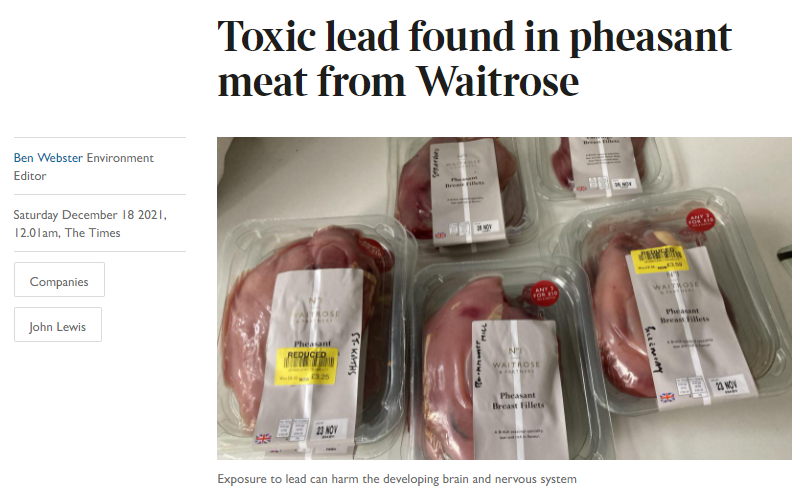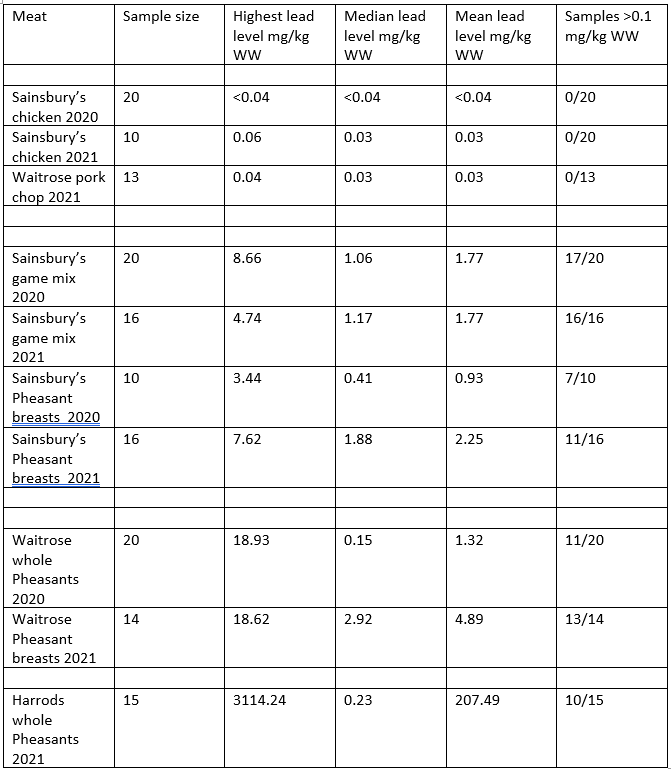High lead levels in Waitrose and Harrods game meat

Last week, we told you about the high levels of lead in Sainsbury’s game meat, now we have the results of similar tests of game meat purchased from Waitrose and Harrods. Both stores are selling game meat with high lead levels too.
It is particularly disappointing that Waitrose’s game has high lead levels as they have promised to go lead-free – there is no indication from our results that they have made any progress with this at all. Waitrose Pheasant fillets bought in stores in Essex and London in late November, and tested for lead content at the University of the Highlands and Islands, had high lead levels – higher even than the results from the samples that we had analysed from last year’s shooting season.
Other meats, such as beef, chicken, pork, have Maximum Levels of lead set by regulations. The MLs for these meats are 0.1mg of lead per kg of wet weight of the meat. No such MLs are set for game meat despite there being high levels of lead in game meat which mostly derive from contamination by lead ammunition.
Our tests, from last shooting season and this season show that chicken and pork samples have low lead levels (as expected), but game meat samples from Waitrose, Sainsbury’s and Harrods all have high levels of lead. In all cases the samples of game meat had levels of lead that would be illegal if they were found in other meats. See table below.

The median levels of lead are probably the fairest comparisons as they are not so influenced by the occasional very high sample; Waitrose’s Pheasant fillets from this year had the highest median lead levels of any of our samples from this or last shooting season.
Lead is a poison – that’s why it has been removed from paints, fishing weights, water pipes and petrol – but it is still shot into wild birds such as Pheasants whose meat then goes into the human food chain. As lead shotgun pellets pass through the flesh of a bird or mammal tiny fragments fly off the pellet and are distributed through the animal. These are too small to see or remove and they give the game meat high lead levels.
The Food Standards Agency and NHS England warn against eating game shot with lead, especially by pregnant women, women trying to become pregnant and young children.
Waitrose told The Times that they believe that these results were caused by environmental residues and not by lead shot. Wild Justice believes that this is overwhelmingly unlikely. Dr Mark Taggart, whose laboratory analysed our game meat samples, told The Times that it was unlikely that the very high lead levels were caused by birds consuming lead in the countryside.
Wild Justice said: Two years ago Waitrose promised that their game meat would be lead-free by now – it isn’t. Their game meat has high levels of lead in it. Lead is a poison. These lead levels would be illegal in other meats. The most overwhelmingly likely explanation for such very high lead levels is contamination by fragments of lead shot. There is no Lead Fairy sprinkling lead into Waitrose game meat.
Waitrose have not apologised for, or explained, their failure. Why is a small organisation like Wild Justice having to test the levels of poison in meat sold by a major retailer? These tests cost a few hundred quid – why didn’t Waitrose test their own game meat?
Waitrose have agreed to meet Wild Justice for a chat about lead in game meat.
DEFRA received an expert report in 2015 that recommended the phasing out of lead ammunition for environmental and food safety reasons. DEFRA is still thinking about banning the use of lead ammunition some time in the future. It is long past the time when government, retailers and the shooting industry should have got rid of lead from game meat in the human food chain and from contaminating the environment through the use of lead shot.
Wild Justice is a not-for-profit organisation set up by Chris Packham, Ruth Tingay and Mark Avery. We are entirely dependent on donations. To support our work – click here. To hear more about our campaigns and legal cases subscribe to our free newsletter – click here.
